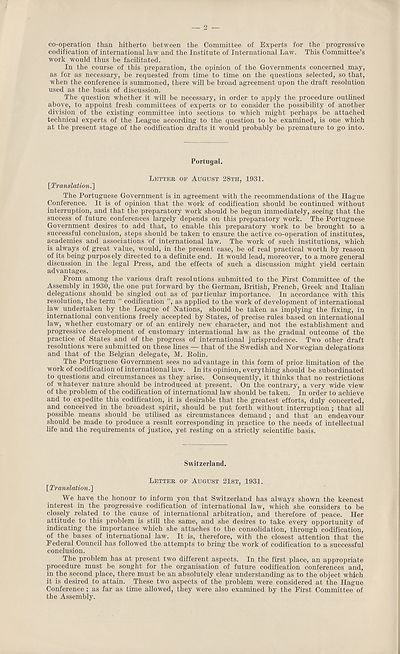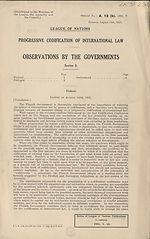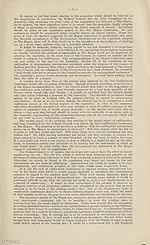Legal > Progressive codification of international law : observations by the governments : series 3
(2)
Download files
Complete book:
Individual page:
Thumbnail gallery: Grid view | List view

co-operation than hitherto between the Committee of Experts for the progressive
codification of international law and the Institute of International Law. This Committee’s
work would thus be facilitated.
In the course of this preparation, the opinion of the Governments concerned may,
as for as necessary, be requested from time to time on the questions selected, so that,
when the conference is summoned, there will be broad agreement upon the draft resolution
used as the basis of discussion.
The question whether it will be necessary, in order to apply the procedure outlined
above, to appoint fresh committees of experts or to consider the possibility of another
division of the existing committee into sections to which might perhaps be attached
technical experts of the League according to the question to be examined, is one which
at the present stage of the codification drafts it would probably be premature to go into.
Portugal.
Letter of August 28th, 1931.
[Translation.']
The Portuguese Government is in agreement with the recommendations of the Hague
Conference. It is of opinion that the work of codification should be continued without
interruption, and that the preparatory work should be begun immediately, seeing that the
success of future conferences largely depends on this preparatory work. The Portuguese
Government desires to add that, to enable this preparatory work to be brought to a
successful conclusion, steps should be taken to ensure the active co-operation of institutes,
academies and associations of international law. The work of such institutions, which
is always of great value, would, in the present case, be of real practical worth by reason
of its being purposely directed to a definite end. It would lead, moreover, to a more general
discussion in the legal Press, and the effects of such a discussion might yield certain
advantages.
Prom among the various draft resolutions submitted to the First Committee of the
Assembly in 1930, the one put forward by the German, British, French, Greek and Italian
delegations should be singled out as of particular importance. In accordance with this
resolution, the term “ codification ”, as applied to the work of development of international
law undertaken by the League of Nations, should be taken as implying the fixing, in
international conventions freely accepted by States, of precise rules based on international
law, whether customary or of an entirely new character, and not the establishment and
progressive development of customary international law as the gradual outcome of the
practice of States and of the progress of international jurisprudence. Two other draft
resolutions were submitted on these lines — that of the Swedish and Norwegian delegations
and that of the Belgian delegate, M. Bolin.
The Portuguese Government sees no advantage in this form of prior limitation of the
work of codification of international law. In its opinion, everything should be subordinated
to questions and circumstances as they arise. Consequently, it thinks that no restrictions
of whatever nature should be introduced at present. On the contrary, a very wide view
of the problem of the codification of international law should be taken. In order to achieve
and to expedite this codification, it is desirable that the greatest efforts, duly concerted,
and conceived in the broadest spirit, should be put forth without interruption ; that all
possible means should be utilised as circumstances demand ; and that an endeavour
should be made to produce a result corresponding in practice to the needs of intellectual
life and the requirements of justice, yet resting on a strictly scientific basis.
Switzerland.
Letter of August 21st, 1931.
[Translation.]
We have the honour to inform you that Switzerland has always shown the keenest
interest in the progressive codification of international law, which she considers to be
closely related to the cause of international arbitration, and therefore of peace. Her
attitude to this problem is still the same, and she desires to take every opportunity of
indicating the importance which she attaches to the consolidation, through codification,
of the bases of international law. It is, therefore, with the closest attention that the
Federal Council has followed the attempts to bring the work of codification to a successful
conclusion.
The problem has at present two different aspects. In the first place, an appropriate
procedure must be sought for the organisation of future codification conferences and,
in the second place, there must be an absolutely clear understanding as to the object which
it is desired to attain. These two aspects of the problem were considered at the Hague
Conference ; as far as time allowed, they were also examined by the First Committee of
the Assembly.
codification of international law and the Institute of International Law. This Committee’s
work would thus be facilitated.
In the course of this preparation, the opinion of the Governments concerned may,
as for as necessary, be requested from time to time on the questions selected, so that,
when the conference is summoned, there will be broad agreement upon the draft resolution
used as the basis of discussion.
The question whether it will be necessary, in order to apply the procedure outlined
above, to appoint fresh committees of experts or to consider the possibility of another
division of the existing committee into sections to which might perhaps be attached
technical experts of the League according to the question to be examined, is one which
at the present stage of the codification drafts it would probably be premature to go into.
Portugal.
Letter of August 28th, 1931.
[Translation.']
The Portuguese Government is in agreement with the recommendations of the Hague
Conference. It is of opinion that the work of codification should be continued without
interruption, and that the preparatory work should be begun immediately, seeing that the
success of future conferences largely depends on this preparatory work. The Portuguese
Government desires to add that, to enable this preparatory work to be brought to a
successful conclusion, steps should be taken to ensure the active co-operation of institutes,
academies and associations of international law. The work of such institutions, which
is always of great value, would, in the present case, be of real practical worth by reason
of its being purposely directed to a definite end. It would lead, moreover, to a more general
discussion in the legal Press, and the effects of such a discussion might yield certain
advantages.
Prom among the various draft resolutions submitted to the First Committee of the
Assembly in 1930, the one put forward by the German, British, French, Greek and Italian
delegations should be singled out as of particular importance. In accordance with this
resolution, the term “ codification ”, as applied to the work of development of international
law undertaken by the League of Nations, should be taken as implying the fixing, in
international conventions freely accepted by States, of precise rules based on international
law, whether customary or of an entirely new character, and not the establishment and
progressive development of customary international law as the gradual outcome of the
practice of States and of the progress of international jurisprudence. Two other draft
resolutions were submitted on these lines — that of the Swedish and Norwegian delegations
and that of the Belgian delegate, M. Bolin.
The Portuguese Government sees no advantage in this form of prior limitation of the
work of codification of international law. In its opinion, everything should be subordinated
to questions and circumstances as they arise. Consequently, it thinks that no restrictions
of whatever nature should be introduced at present. On the contrary, a very wide view
of the problem of the codification of international law should be taken. In order to achieve
and to expedite this codification, it is desirable that the greatest efforts, duly concerted,
and conceived in the broadest spirit, should be put forth without interruption ; that all
possible means should be utilised as circumstances demand ; and that an endeavour
should be made to produce a result corresponding in practice to the needs of intellectual
life and the requirements of justice, yet resting on a strictly scientific basis.
Switzerland.
Letter of August 21st, 1931.
[Translation.]
We have the honour to inform you that Switzerland has always shown the keenest
interest in the progressive codification of international law, which she considers to be
closely related to the cause of international arbitration, and therefore of peace. Her
attitude to this problem is still the same, and she desires to take every opportunity of
indicating the importance which she attaches to the consolidation, through codification,
of the bases of international law. It is, therefore, with the closest attention that the
Federal Council has followed the attempts to bring the work of codification to a successful
conclusion.
The problem has at present two different aspects. In the first place, an appropriate
procedure must be sought for the organisation of future codification conferences and,
in the second place, there must be an absolutely clear understanding as to the object which
it is desired to attain. These two aspects of the problem were considered at the Hague
Conference ; as far as time allowed, they were also examined by the First Committee of
the Assembly.
Set display mode to:
![]() Universal Viewer |
Universal Viewer | ![]() Mirador |
Large image | Transcription
Mirador |
Large image | Transcription
Images and transcriptions on this page, including medium image downloads, may be used under the Creative Commons Attribution 4.0 International Licence unless otherwise stated. ![]()
| League of Nations > Legal > Progressive codification of international law : observations by the governments : series 3 > (2) |
|---|
| Permanent URL | https://digital.nls.uk/191516560 |
|---|
| Shelfmark | LN.V |
|---|
| Description | Over 1,200 documents from the non-political organs of the League of Nations that dealt with health, disarmament, economic and financial matters for the duration of the League (1919-1945). Also online are statistical bulletins, essential facts, and an overview of the League by the first Secretary General, Sir Eric Drummond. These items are part of the Official Publications collection at the National Library of Scotland. |
|---|---|
| Additional NLS resources: |
|

